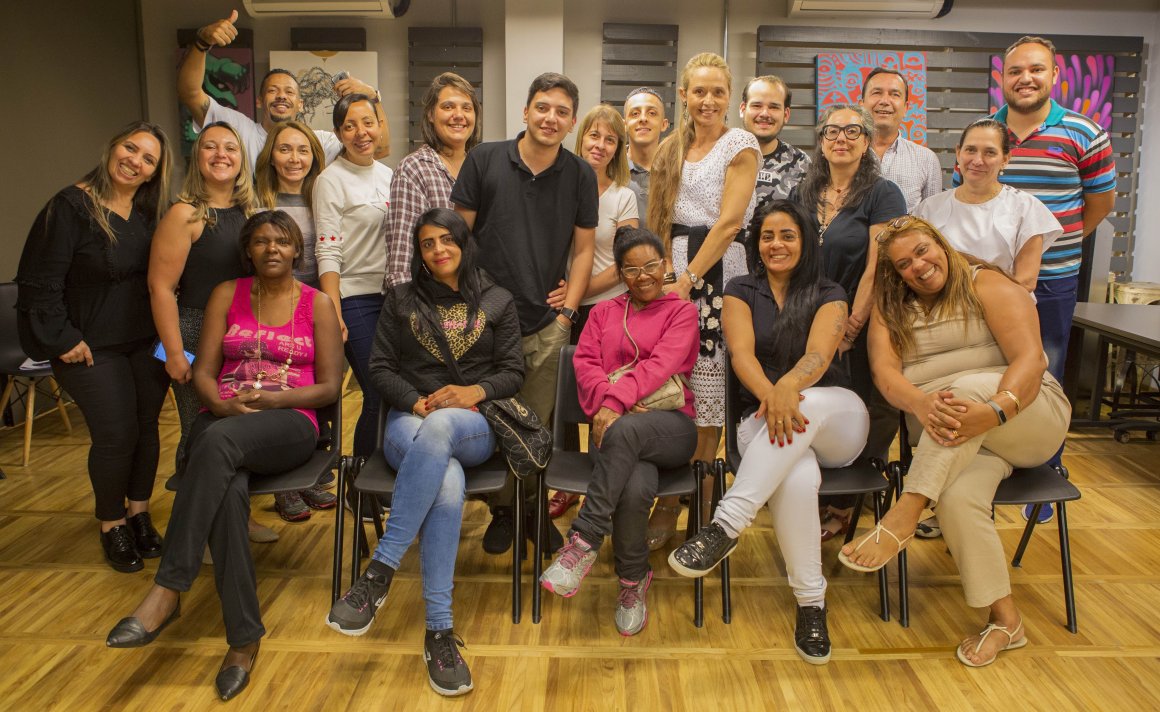Former female detainees of Humanitas360’s cooperative set off new phase of project originated at the penitentiary
The Humanitas360 Institute held a meeting with five freed women associated in the work cooperative, supported by the project Entrepreneurship Behind and Beyond Bars. The encounter sets off a new phase of the work they began when they were imprisoned at Women’s Penitentiary II, in Tremembé, São Paulo (Brazil), with the cooperative named Lili. Now they will work from home with sales support provided by H360.
During the day, they attended a breakfast with the institute’s staff, had individual meetings with a psychologist and social worker – which was facilitated by the Responsa Project –, and were given legal and work guidance in order to plan the next steps. They also had massage sessions and paid Beco do Batman (Batman Alley, a tourist spot in Vila Madalena neighborhood) a visit. “This is the first time I come to São Paulo on a leisure trip and I loved seeing the alley,” said Ana Cristina, one of the cooperative members.
Out of prison weeks ago, Tânia highlighted the joy to return to her home and children. Nevertheless, she pointed out several difficulties in the readaptation process. “I’m still a little bit in shock, I’m facing reality just now. Having to solve practical problems that I didn’t deal with when I was in prison is difficult. If I didn’t have my family with me and all the support I’m getting from so many people, I wouldn’t have the strength to wait and look for a job or give my kids a gift they want. It’s tempting to go back to the easy money, which would send me back to that place,” she said.
The members of the cooperative will proceed with the production and divide themselves between tasks – cutting, sewing, embroidery and crochet. They will be provided with material to create handbags, wallets and placemats, as well as artwork. Just like all that was produced within the penitentiary, the products will be marketed by the brand Tereza from next year, and all income will be divided among the cooperative members.
The president of H360, Patrícia Villela Marino, told the women about an encounter she had recently with Sônia Leal, a leader for the Embroiderers of Jardim da Conceição (in São Paulo, Brazil) who gave several workshops to members of the Lili cooperative. “Many of them can work from 6 to 8 hours a day there and still follow a routine with their children and be present,” she underscored. It is worth reminding that these women are often single mothers with more than one child.
The five of them highlighted the joy to go back to work after the cooperative in Women’s Penitentiary II in Tremembé was closed. They also stated the will to structure the project as an alternative source of income for the women that are yet to be freed from the correctional system. “We are very united and now we are going to get the other girls,” underlined Anaysa.
Meet the cooperative members of the new project:
Glaucia – 42 years old, a widow, 3 children, lives in Cruzeiro, São Paulo. In addition to continuing sewing and embroidering for the cooperative, she started selling roast chicken in her garage on the weekends. She served 6 years and 9 months in prison and at the end of that period she joined the cooperative. She was released in August 2018 and already paid part of her penalty-fine. Her mother took care of the children and with that she started receiving Glaucia’s ex-husband pension, which supplemented her income. She is currently threatened by her mother going to court to ask for an increase in her children’s pension.
Anaysa – 35 years old, lives with her partner in Cubatão, São Paulo, and has 3 children. She embroiders for the Lili Cooperative. When she left prison in May 2019, the money she earned at the cooperative was used to buy a wooden house. Her mother-in-law also gave her a stall to sell hamburgers.
Ana Cristina – 47 years old, has 5 children and lives in São José dos Campos, São Paulo. She currently paints and embroiders dishcloths with techniques acquired in the cooperative. She sells her work in the streets. She also embroiders at Lili. She was released in February 2019 and currently lives with her daughter, son-in-law, granddaughter and ex-husband. The children live apart — one in a shelter, the other is married and the other one lives with relatives. She served 4 years and 10 months in prison.
Dirce – 48 years old, a widow, has 1 child and lives in an assisted house in Itanhém, São Paulo. She has been institutionalized since she was 4 years old – in shelters, in the youth detention center formerly known as Febem and later in adult prisons. She suffered from various forms of child abuse. She used to live in Cracolândia (the “crackland” in the central region of São Paulo) and by that time she lost custody of her son. She currently crochets and sells her products in Inhanhém beach. She dreams of seeing her son again; he is now a 32 year-old man. She served 9 years and 4 months in prison and has been free since May 2019.
Tania – 34 years old, single, mother of 3 children, lives in Taubaté, São Paulo. She embroiders, crochets and she is also one of the cooperative leaders – she used to coordinate the production when she was in prison. Currently works as a housekeeper. She just got out of prison on parole.
(Tradução: Andrei Reina)

